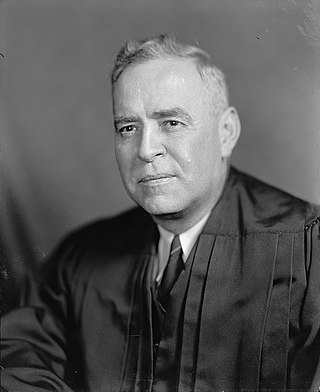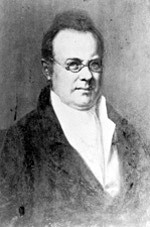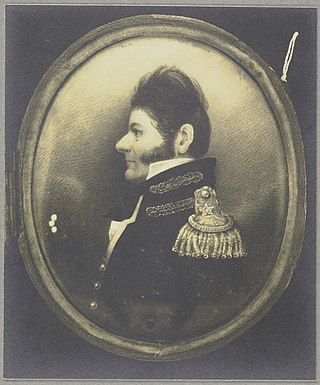
Rutledge is a borough in Delaware County, Pennsylvania, United States. The population was 782 at the 2020 census, down from 860 at the 2000 census.

Edward Rutledge was an American Founding Father and politician who signed the Continental Association and was the youngest signatory of the Declaration of Independence. He later served as the 39th governor of South Carolina.

Christopher Gadsden was an American politician who was the principal leader of the South Carolina Patriot movement during the American Revolution. He was a delegate to the Continental Congress, a brigadier general in the Continental Army during the American Revolutionary War, Lieutenant Governor of South Carolina, a merchant, and the designer of the Gadsden flag. He is a signatory to the Continental Association.

Wiley Blount Rutledge Jr. was an American jurist who served as an associate justice of the Supreme Court of the United States from 1943 to 1949. The ninth and final justice appointed by President Franklin D. Roosevelt, he is best known for his impassioned defenses of civil liberties. Rutledge favored broad interpretations of the First Amendment, the Due Process Clause, and the Equal Protection Clause, and he argued that the Bill of Rights applied in its totality to the states. He participated in several noteworthy cases involving the intersection of individual freedoms and the government's wartime powers. Rutledge served on the Court until his death at the age of fifty-five. Legal scholars have generally thought highly of the justice, although the brevity of his tenure has minimized his impact on history.
South Carolina was outraged over British tax policies in the 1760s that violated what they saw as their constitutional right to "no taxation without representation". Merchants joined the boycott against buying British products. When the London government harshly punished Massachusetts for the Boston Tea Party, South Carolina's leaders joined eleven other colonies in forming the Continental Congress. When the British attacked Lexington and Concord in the spring of 1775 and were beaten back by the Massachusetts Patriots, South Carolina Patriots rallied to support the American Revolution. Loyalists and Patriots of the colony were split by nearly 50/50.

Hoppin' John, also known as Carolina peas and rice, is a peas and rice dish served in the Southern United States. It is made with cowpeas, mainly, black-eyed peas and Sea Island red peas in the Sea Islands and iron and clay peas in the Southeast US, and rice, chopped onion, and sliced bacon, seasoned with salt. Some recipes use ham hock, fatback, country sausage, or smoked turkey parts instead of bacon. A few use green peppers or vinegar and spices. Smaller than black-eyed peas, field peas are used in the South Carolina Lowcountry and coastal Georgia. Black-eyed peas are the norm elsewhere.

Christopher Ellery was a United States senator from Rhode Island. Born in Newport, he graduated from Yale College in 1787, studied law, was admitted to the bar and commenced practice in Newport. He was clerk of the superior court of Newport County from 1794 to 1798.
Archibald Hamilton Rutledge (1883–1973) was an American poet and educator, the first South Carolina poet laureate from 1934 to 1973. He wrote over 50 books and many poems, usually about his hunting and life experiences in South Carolina.

John Rutledge Jr. was a United States representative from South Carolina. Born in Charles Town in the Province of South Carolina, he was a son of John Rutledge, who was President of South Carolina, Governor of South Carolina, a Continental Congressman, Philadelphia Convention Framer of the United States Constitution, and Chief Justice of the Supreme Court of the United States, and a nephew of Edward Rutledge, another Continental Congressman from South Carolina. The younger John received private instruction and also attended school in Charleston and Philadelphia. He studied law with his father, was admitted to the bar about 1787 and practiced in Charleston; he also engaged as a planter. From 1794 to 1797, he was a member of the South Carolina House of Representatives. He was an unsuccessful candidate for election in 1794 to the Fourth Congress, and was elected as a Federalist to the Fifth, Sixth, and Seventh Congresses, serving from March 4, 1797, to March 3, 1803. He was an unsuccessful candidate for election to the Thirteenth Congress, and commanded a company of the Twenty-eighth Regiment, South Carolina Militia, in 1799. He was promoted to major and in 1804 succeeded to the command of the regiment and served as its commander in the War of 1812. He commanded the Seventh Brigade from 1816 until his death in Philadelphia.
The Middleton-Rutledge-Pinckney family is a family of politicians from the United States.

The Governor John Rutledge House is a historic house at 116 Broad Street in Charleston, South Carolina. Completed in 1763 by an unknown architect, it was the home of Founding Father John Rutledge, a Governor of South Carolina and a signer of the United States Constitution. It was declared a National Historic Landmark in 1973.

John Rutledge was an American Founding Father, politician, and jurist who served as one of the original associate justices of the Supreme Court and the second chief justice of the United States. Additionally, he served as the first president of South Carolina and later as its first governor after the Declaration of Independence was signed.

John Mathews was a Founding Father of the United States and lawyer from Charleston, South Carolina. He was a delegate to the Continental Congress from 1778 to 1781 where he endorsed the Articles of Confederation on behalf of South Carolina. On his return, he was elected the 33rd governor of South Carolina, serving a single term in 1782 and 1783.

Christopher W. Werner (1805–1875) was a nineteenth-century wrought iron manufacturer, artisan, and entrepreneur based in Charleston, South Carolina, US. He was one of three noted German-American ironworkers in Charleston, who created most of its high-quality wrought iron. He had immigrated from Prussia in his late 20s, already an accomplished businessman. In Charleston he married a young woman from England, another immigrant, and they had a family.

The Attorney General of South Carolina is the state's chief legal officer and prosecutor.
Governor Rutledge may refer to:
William Dewitt was a South Carolina planter, lawyer, and politician who was a Captain in the American Revolutionary War. He was a Member of the South Carolina House of Representatives 6 years after the signing of the Declaration of Independence. He attended the South Carolina ratifying convention in Charleston. He was one of the delegates that agreed to ratify the Constitution of the United States of America.

John Rutledge was twice nominated by President George Washington to the Supreme Court of the United States, being nominated and confirmed in 1789 as an associate justice, and being unsuccessfully nominated in 1795 to serve as chief justice.

Wiley Rutledge was nominated to serve as an associate justice of the Supreme Court of the United States by U.S. President Franklin D. Roosevelt on January 11, 1943, after the resignation of James F. Byrnes created a vacancy on the court. Per the Constitution of the United States, Rutledge's nomination was subject to the advice and consent of the United States Senate, which holds the determinant power to confirm or reject nominations to the U.S. Supreme Court. After being favorably reported on by both a subcommittee of the Senate Committee on the Judiciary and the full Judiciary Committee, the nomination was confirmed by the full Senate through a voice vote on February 8, 1943.












